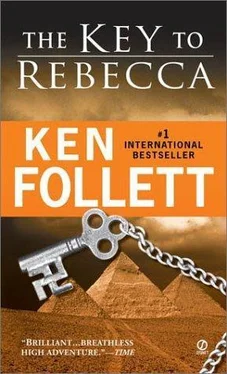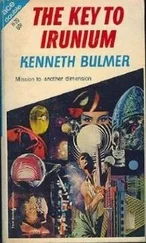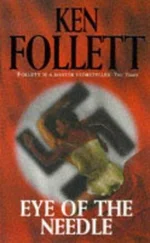Ken Follett - The Key to Rebecca
Здесь есть возможность читать онлайн «Ken Follett - The Key to Rebecca» весь текст электронной книги совершенно бесплатно (целиком полную версию без сокращений). В некоторых случаях можно слушать аудио, скачать через торрент в формате fb2 и присутствует краткое содержание. Жанр: Шпионский детектив, на английском языке. Описание произведения, (предисловие) а так же отзывы посетителей доступны на портале библиотеки ЛибКат.
- Название:The Key to Rebecca
- Автор:
- Жанр:
- Год:неизвестен
- ISBN:нет данных
- Рейтинг книги:4 / 5. Голосов: 1
-
Избранное:Добавить в избранное
- Отзывы:
-
Ваша оценка:
- 80
- 1
- 2
- 3
- 4
- 5
The Key to Rebecca: краткое содержание, описание и аннотация
Предлагаем к чтению аннотацию, описание, краткое содержание или предисловие (зависит от того, что написал сам автор книги «The Key to Rebecca»). Если вы не нашли необходимую информацию о книге — напишите в комментариях, мы постараемся отыскать её.
The Key to Rebecca — читать онлайн бесплатно полную книгу (весь текст) целиком
Ниже представлен текст книги, разбитый по страницам. Система сохранения места последней прочитанной страницы, позволяет с удобством читать онлайн бесплатно книгу «The Key to Rebecca», без необходимости каждый раз заново искать на чём Вы остановились. Поставьте закладку, и сможете в любой момент перейти на страницу, на которой закончили чтение.
Интервал:
Закладка:
I will not be sick, I will not be sick, I will not be sick. The train says it for me, rattling on the tracks. I’m too old to throw up on trains now, I used to do that when I was eight. Dad took me to Alexandria, bought me candy and oranges and lemonade, I ate too much, don’t think about it, it makes me ill to think about it, Dad said it wasn’t my fault it was his, but I always used to feel sick even if I didn’t eat, today Elene bought chocolate but I said no, thanks, I’m pretty grown-up to say no to chocolate, kids never say no to chocolate, look, I can see the pyramids, one, two, and the little one makes three, this must be Giza. Where are we going? He was supposed to take me to school. Then he got out the knife. It’s curved. He’ll cut off my head, where’s Dad? I should be in school, we have geography in the first period today, a test on the Norwegian fjords, I learned it all last night, I needn’t have bothered, I’ve missed the test. They’ve already finished it by now, Mr. Johnstone collecting up the papers, You call that a map, Higgins? Looks more like a drawing of your ear, boy! Everybody laughs. Smythe can’t spell Moskenstraumen. Write it fifty times, lad. Everyone is glad he isn’t Smythe. Old Johnstone opens the textbook. Next, the Arctic tundra. I wish I was in school. I wish Elene would put her arm round me. I wish the man would stop looking at me, staring at me like that, so pleased with himself, I think he’s crazy, where’s Dad? If I don’t think about the knife, it will be just as if it wasn’t there. I mustn’t think about the knife. If I concentrate on not thinking about the knife, that’s the same as thinking about the knife. It’s impossible to deliberately not think about something. How does anyone stop thinking of something? Accidentally. Accidental thoughts. All thoughts are accidental. There, I stopped thinking about the knife for a second. If I see a policeman, I’ll rush up to him and yell Save me, save me! I’ll be so quick that he won’t be able to stop me. I can run like the wind, I’m quick. I might see an officer. I might see a general. I’ll shout, Good morning, General! He’ll look at me, surprised, and say Well, young fellow-me-lad, you’re a fine boy! Pardon me, sir, I’ll say, I’m Major Vandam’s son, and this man is taking me away, and my father doesn’t know, I’m sorry to trouble you, but I need help. What? says the general. Look here, sir, you can’t do this to the son of a British officer! Not cricket, you know! Just clear off, d‘you hear? Who the devil d’you think you are? And you needn’t flash that little penknife at me, I’ve got a pistol! You’re a brave lad, Billy. I’m a brave lad. All day men get killed in the desert. Bombs fall, Back Home. Ships in the Atlantic get sunk by U-boats, men fall into the icy water and drown. RAF chaps shot down over France. Everybody is brave. Chin up! Damn this war. That’s what they say: Damn this war. Then they climb into the cockpit, hurry down the air-raid shelter, attack the next dune, fire torpedoes at the U-boats, write letters home. I used to think it was exciting. Now I know better. It isn’t exciting at all. It makes you feel sick.
Billy is so pale. He looks it. He’s trying to be brave. He shouldn‘t, he should act like a child, he should scream and cry and throw a tantrum, Wolff couldn’t cope with that; but he won’t, of course, for he has been taught to be tough, to bite back the cry, to suppress the tears, to have self-control. He knows how his father would be, what else does a boy do but copy his father? Look at Egypt. A canal alongside the railway line. A grove of date palms. A man crouching in a field, his galabiya hitched up above his long white undershorts, doing something to the crops; an ass grazing, so much healthier than the miserable specimens you see pulling carts in the city; three women sitting beside the canal, washing clothes, pounding them on stones to get them clean; a man on horseback, galloping, must be the local effendi, only the richest peasants have horses; in the distance, the lush green countryside ends abruptly in a range of dusty tan hills. Egypt is only thirty miles wide, really: the rest is desert. What am I going to do? That chill, deep in my chest, every time I look at Wolff. The way he stares at Billy. The gleam in his eye. His restlessness: the way he looks out of the window, then around the carriage, then at Billy, then at me, then at Billy again, always with that gleam in his eye, the look of triumph. I should comfort Billy. I wish I knew more about boys, I had four sisters. What a poor step-mother I should be for Billy. I’d like to touch him, put my arm around him, give him a quick squeeze, or even a cuddle, but I’m not sure that’s what he wants, it might make him feel worse. Perhaps I could take his mind off things by playing a game. What a ridiculous idea. Perhaps not so ridiculous. Here is his school satchel. Here is an exercise book. He looks at me curiously. What game? Noughts and crosses. Four lines for the grid; my cross in the center. The way he looks at me as he takes the pencil, I do believe he’s going along with this crazy idea in order to comfort me! His nought in the corner. Wolff snatches the book, looks at it, shrugs, and gives it back. My cross, Billy’s nought; it will be a drawn game. I should let him win next time. I can play this game without thinking, more’s the pity. Wolff has a spare radio at Assyut. Perhaps I should stay with him, and try to prevent him using the radio. Some hope! I have to get Billy away, then contact Vandam and tell him where I am. I hope Vandam saw, the atlas. Perhaps the servant saw it, and called GHQ. Perhaps it will lie on the chair all day, unnoticed. Perhaps Vandam will not go home today. I have to get Billy away from Wolff, away from that knife. Billy makes a cross in the center of a new grid. I make a nought, then scribble hastily: We must escape —be ready. Billy makes another cross, and: OK. My nought. Billy’s cross and When? My nought and Next station. Billy’s third cross makes a line. He scores through the line of crosses, then smiles up at me jubilantly. He has won. The train slows down.
Vandam knew the train was still ahead of him. He had stopped at the station at Giza, close to the pyramids, to ask how long ago the train had passed through; then he had stopped and asked the same question at three subsequent stations. Now, after traveling for an hour, he had no need to stop and ask, for the road and the railway line ran parallel, on either side of a canal, and he would see the train when he caught up with it.
Each time he stopped he had taken a drink of water. With his uniform cap, his goggles and the scarf around his mouth and neck, he was protected from the worst of the dust; but the sun was terribly hot and he was continually thirsty. Eventually he realized he was running a slight fever. He thought he must have caught cold, last night, lying on the ground beside the river for hours. His breath was hot in his throat, and the muscles of his back ached.
He had to concentrate on the road. It was the only road which ran the length of Egypt, from Cairo to Aswan, and consequently much of it was paved; and in recent months the Army had done some repair work: but he still had to watch for bumps and potholes. Fortunately the road ran straight as an arrow, so he could see, far ahead, the hazards of cattle, wagons, camel trains and flocks of sheep. He drove very fast, except through the villages and towns, where at any moment people might wander out into the road: he would not kill a child to save a child, not even to save his own child.
So far he had passed only two cars—a ponderous Rolls-Royce and a battered Ford. The Rolls had been driven by a uniformed chauffeur, with an elderly English couple in the backseat; and the old Ford had contained at least a dozen Arabs. By now Vandam was fairly sure Wolff was traveling by train.
Читать дальшеИнтервал:
Закладка:
Похожие книги на «The Key to Rebecca»
Представляем Вашему вниманию похожие книги на «The Key to Rebecca» списком для выбора. Мы отобрали схожую по названию и смыслу литературу в надежде предоставить читателям больше вариантов отыскать новые, интересные, ещё непрочитанные произведения.
Обсуждение, отзывы о книге «The Key to Rebecca» и просто собственные мнения читателей. Оставьте ваши комментарии, напишите, что Вы думаете о произведении, его смысле или главных героях. Укажите что конкретно понравилось, а что нет, и почему Вы так считаете.












